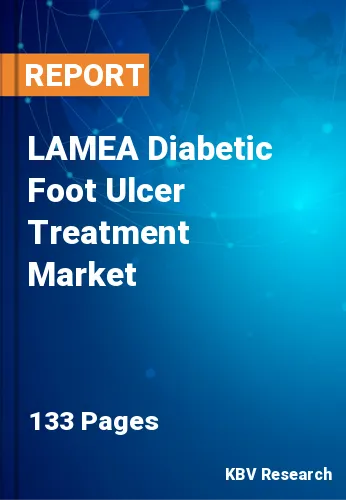The Latin America, Middle East and Africa Diabetic Foot Ulcer Treatment Market would witness market growth of 7.5% CAGR during the forecast period (2023-2030).
Those who are appropriately educated and knowledgeable about anatomy and infection control may treat a diabetic foot ulcer. These elements are actively promoting market expansion and assisting pharmaceutical companies in maximizing market revenue. Demand for the therapy of diabetes and diabetic foot ulcers is increasing at the hospitals that provide cutting-edge amenities to diabetic patients.
Rapid development and urbanization have increased peoples' lifestyle choices, which has led to the emergence of many chronic illnesses. The most prevalent chronic disease seen in individuals, among numerous others, is diabetes. Due to the body's diminished natural ability to repair itself, sepsis and infection may quickly develop in diabetics, leading to various problems.
Many of the nations in the area have seen significant social and economic upheaval during the last thirty years. Rapid economic development and urbanization in several Gulf States have been linked to lower newborn mortality rates and longer life expectancies. In the Middle East and North Africa region in 2015, 9.1% (6.3-12.2%) of persons aged 20 to 79, or 35.4 (24.3-47.4 million), had diabetes. Of them, almost 40.6% still need to be diagnosed. This increases the likelihood of diabetic foot ulcers in the area. The UAE government aims to increase the number of people traveling there for medical treatment. Arab Health, the region's leading healthcare conference and trade show held yearly in Dubai, continues to catalyze new concepts, alliances, innovations, and teamwork. The UAE government has designated healthcare as a priority sector in its Vision 2040, and the nation will continue to be a desirable place to establish a regional distribution hub for healthcare services. The market participants in the LAMEA area will also benefit from strong growth opportunities.
The Brazil market dominated the LAMEA Diabetic Foot Ulcer Treatment Market by Country in 2022, and would continue to be a dominant market till 2030; thereby, achieving a market value of $98.2 million by 2030. The Argentina market is showcasing a CAGR of 8.1% during (2023 - 2030). Additionally, The UAE market would register a CAGR of 7.2% during (2023 - 2030).
Based on Product, the market is segmented into Wound Care Dressings, Wound Care Devices (Negative Pressure Wound Therapy, and Others), Biologics, and Others. Based on Type, the market is segmented into Neuroischemic Ulcers, Neuropathic Ulcers, and Ischemic Ulcers. Based on End User, the market is segmented into Homecare Settings, Hospitals, and Others. Based on countries, the market is segmented into Brazil, Argentina, UAE, Saudi Arabia, South Africa, Nigeria, and Rest of LAMEA.
Free Valuable Insights: The Worldwide Diabetic Foot Ulcer Treatment Market is Projected to reach USD 6.5 Billion by 2030, at a CAGR of 5.2%
The market research report covers the analysis of key stake holders of the market. Key companies profiled in the report include Coloplast Group, B. Braun Melsungen AG, Integra LifeSciences Holdings Corporation, Smith & Nephew PLC, Cardinal Health, Inc., Medtronic PLC, 3M Company, Molnlycke Health Care AB, Essity AB and ConvaTec Group PLC.
By Product
By Type
By End User
By Country
Our team of dedicated experts can provide you with attractive expansion opportunities for your business.

